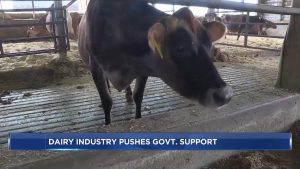
Estate Plan Edge: Here’s what the president’s proposals look like for farmers paying income taxes, capital gains taxes, estate taxes and more.
As the election campaign season heats up, a review of the Biden administration’s budget proposals may be in order. In March these were released in what is generally known as the Green Book, titled “General Explanations of the Administration’s Fiscal Year 2025 Revenue Proposals.”
Let’s highlight some of the proposals that may be most relevant to farm families, starting with income taxes, followed by capital gains and estate taxes.
Income taxes. Many farmers operate as a subchapter S corporation. After paying themselves a reasonable salary, any remaining corporate profits can be distributed to them without the 12.4% Social Security tax (on up to $168,600 in 2024), the 2.9% Medicare tax or the additional 0.9% Net Investment Income Tax (NIIT) that, under the Affordable Care Act, is added if your income exceeds $200,000 for single or $250,000 married. The proposed change would cause all S corporation profits to be subject to those three taxes.
The NIIT itself would be increased by about one-third on any taxpayer with more than $400,000 of earnings, from the current 3.8% maximum rate to 5%.
Currently the top marginal individual income tax rate is 37%, and for a single taxpayer only applies to income over $609,350. The proposal would increase that rate to 39.6% and apply to income above $400,000.
Corporate income tax rates (for a C corporation) would be increased by one-third, from the current flat rate of 21% to a new 28%.
Capital gains taxes. The Green Book includes several proposals concerning qualified dividends and capital gains taxes. For example, high-income taxpayers’ qualified dividends and long-term capital gains would be taxed as ordinary income, at a rate of 44.6% — nearly double the current maximum of 23.8%.
A proposed change would limit the deferral of capital gains on like-kind exchanges to deferral of $500,000 capital gains in any given year. Given the previous proposal, the gain on a large transaction could be taxed at 44.6%.
Estate taxes. There is an even uglier proposal for estate planning, however. Currently there is no capital gains tax on gifts or estates. Gifted assets carry their basis over to the recipient, who would still pay capital gains taxes on the gain when they sell. But assets that pass on death get a new “step up” in basis, effectively eliminating any pre-death appreciation from taxation, ever. The proposal is to treat transfers of appreciated property by gift or on death as realization events. In other words, capital gains tax would be due on the gift or on death as if the property were sold to the person receiving it. Some exemptions, a bit like estate tax exemptions, apply.
Estate and gift tax proposals include one on the positive side. When farm property is staying in the family, it can often be reported at a discounted value in the estate, called a 2032A special-use valuation. The proposal would increase the maximum amount of discount that can be applied. However, the enforcement lien on the property may extend beyond the current 10 years.
Many farms are planned so the assets can remain in trust for multiple generations and not be estate-taxed at each death. A proposal would limit this to two generations: your grandchildren may get it without tax, but not their children. Other proposals aim at more complex leveraging techniques that we have used for decades in farm transfer planning.
Currently you can give up to $18,000 per donee without reporting it for gift taxes. Give that to each of 10 grandchildren to move $180,000 out of your estate each year. The proposal includes an overall annual cap of $50,000 on such gifts.
Other potential impacts
Current law provides numerous credits, deductions and other special provisions aimed at encouraging fossil fuel production. The proposal would repeal 13 of those to discourage investment in the fossil fuel sector in pursuit of the “administration’s policy of supporting a clean energy economy, reducing our reliance on oil and reducing greenhouse gas emissions.” Fuel prices will be affected, obviously.
The common theme of other changes is to extend what were temporary tax breaks, such as a fully refundable child tax credit, a refundable earned income tax credit and a health insurance premium assistance tax credit.
If these concern you, don’t panic. They reflect the economic and social policy thinking of the Biden-Harris administration. None will be enacted unless both houses of Congress go along, which seems highly unlikely at least until after the election.
You can now read the most important #news on #eDairyNews #Whatsapp channels!!!
🇺🇸 eDairy News INGLÊS: https://whatsapp.com/channel/0029VaKsjzGDTkJyIN6hcP1K























